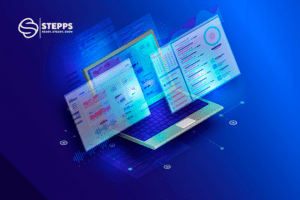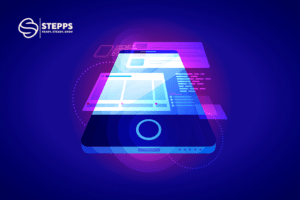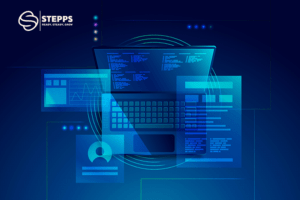Many people around mobile app programming have led to the widespread spread of this concept. Programming has now become the master of the situation in many contexts, and through it the world has become a smaller village than before, and many Internet users have begun to search extensively for programming, its nature, how it affects our current situation, and why has it appeared so much recently?
There is a lot and a lot about programming and what is around it, especially mobile app programming, which in turn received a lot of welcome after their appearance, but they were exposed to many setbacks and multiple experiments until they became in their current easy concept. You can know all these things easily, as now there is a lot of talk about programming in all its types, but through Steps Company you will learn what you do not know about programming smartphone applications.
Mobile app programming stages
Programming was not created from nothing, especially mobile application programming. It goes through many proven steps until we finally reach the satisfactory result that is provided by our company in an exclusive and unique way. In particular, this type of programming is distinguished by the company’s design, as we are distinguished primarily by this type of services related to electronic applications.
Programming smartphone applications is a complex process that includes several thoughtfully organized stages that we can formulate in a satisfactory manner through the following steps:

Understanding and planning are stages of mobile app programming.
Understanding and planning are considered the most important stages, or probably the first and most important stage in developing mobile applications . Through this stage, the objectives of the application are determined, as well as its specifications, and through these details, the basic plan for implementing the project is developed.
Since the understanding and planning stage is one of the most important stages, this is because it includes the processes that take place in this stage and upon which all other stages are built, the basics of which are: target analysis, market study, feature identification, project mapping, project budget, as well as technology selection, then drafting project documents, and finally testing strategy.
If you want to implement your project successfully and on a solid foundation, you have the understanding and planning stage, as they are essential for success in mobile application development, if carefully planned and goals and features are precisely defined.
Interface design is one of the stages of mobile app programming.
Interface design (UI/UX Design) is an important stage in the development of mobile applications, provided to you by Steps Company as one of its services. You can contact us now. This part is related to designing the appearance of the application and how to make it look attractive and easy to use for users. Here are some points included in interface design as a stage in the mobile app programming process:
- Research and Analysis: Through research and analysis, the designer begins to understand the basic objective on which the application is based as well as the target user audience. This is done with great care as it includes studying the market and potential user needs.
- Preparing the foundations: This stage begins with drawing preliminary models of the interface. These models do not have to be the final ones on which the complete design will be built, but these models show the general arrangement of the elements as well as the content on the screen only, without the visual details.
- Interface design: After the foundations have been prepared, the visual elements of the interface are designed based on them. This includes colors, icons, fonts, and images.
- User Experience: At this stage, the overall user experience is designed, by making the application easy to use as well as effective. This includes organizing elements and interactions in a way that ensures a positive user experience.
- Screen Detailing: The stage of preparing an interactive model of an application that is selected by users through their comments.
- Testing and Evaluation: Not all stages are completed to the required quality before they pass the testing and evaluation stage. The user interface design must be tested and evaluated by a sample of the target users to ensure that it meets their needs and provides a satisfactory experience.

Application development is one of the stages of mobile app programming.
Development in general is the stage that comes after design in all its stages and thus in mobile app programming as well. There are stages on which the application development process is based that must be followed with precision and avoid making mistakes, and they are:
- Application programming: This stage basically starts with programming the mobile app programming by using programming languages, each of which has a programming language that suits the target platform, such as the well-known programming language Java, which is used for Android and Swift, or the Objective-C language, which is used for iOS.
- Database: One of the most important stages is the design and implementation of the database, which in turn stores the information needed for the mobile app programming. This includes storing a type of information, which is the information used in the application, such as users, content, and settings.
- Server Programming: This stage is only done if the application requires connection to external servers (such as web servers or database servers), in which case this part of the application must be programmed. In this case, conventional programming languages are not used, but different programming languages such as Node.js or Ruby on Rails are used to program the servers.
- Application testing: One of the final stages of completing the mobile app programming development process is the application testing stage. After completing the application programming, in this case, multiple tests must be conducted to ensure that it works properly and is free of expected and unexpected errors.
- Debugging: We can say that this stage is a complementary stage to the application testing stage, as errors are corrected and any problems that appear during application testing are fixed.
- Compatibility testing: At this stage, the application is tested to ensure its compatibility with mobile devices, as it is tested on a variety of mobile devices and operating systems.
- Preparing for publication: Once the app is successfully tested and ensured to be mobile friendly, it is prepared for publication on app stores such as Google Play for Android and App Store for iOS.
Marketing and promotion are stages of mobile app programming.
The step that has a major factor after mobile app programming because it is responsible for publishing on a wide scale is the step of marketing and promoting applications, which are an essential part of the process of developing mobile app programming, which perform this role accurately. The services of an electronic marketing company in Saudi Arabia include this aspect. A group of activities and stages that must be included in the application development plan, and through the few lines below we will explain to you some of the steps that must be followed until the good marketing process is completed:
As for research and planning, it includes analyzing the market with all its programs, users, and target groups, through which you can develop your marketing strategy, as well as determine the competitive advantage, and then prepare marketing materials. This includes creating attractive marketing materials and paying attention to writing and publishing marketing content.
Another influential step in the marketing process is social media marketing, which includes creating accounts on social media platforms and creating advertising campaigns on these accounts. Online advertising is also a very important and influential matter, which includes the use of paid ads on platforms such as Google Ads and Facebook Ads.
The role of marketing the mobile app programming in the application stores is to improve the application description as well as collect positive reviews, through cooperation with influencers, and this includes cooperation with digital influencers.
Finally, measuring and evaluating performance, which includes using data analysis tools and providing periodic reports, through continuous improvement, which requires improving marketing strategies based on data and feedback.

The last stages of mobile app programming are application support and maintenance.
Application support and maintenance is the last stage of mobile app programming and is considered an important stage that cannot be dispensed with in the process of developing smartphone applications. This stage includes many activities that basically aim to maintain and improve the performance of the application over time, not just the period in which the application was created. Here is a brief overview of the stages of application support and maintenance:
- Responding to problems and requests:
- Receive and respond to problems and inquiries from users quickly and efficiently.
- Provide easy means of communication for users to contact the support team and provide assistance.
- Improve user experience:
- Listen to user feedback and suggestions and implement appropriate changes.
- Improve the user interface and user experience to make the app more user-friendly and effective.
- Platform updates:
- Monitor operating system and mobile device updates and ensure the app is compatible with changes.
- Providing new content and features:
- Develop new features and add new content to the app to attract more users and retain existing ones.
- Continuity of support:
- Ensure continuity of support for users and meet their needs and inquiries.
